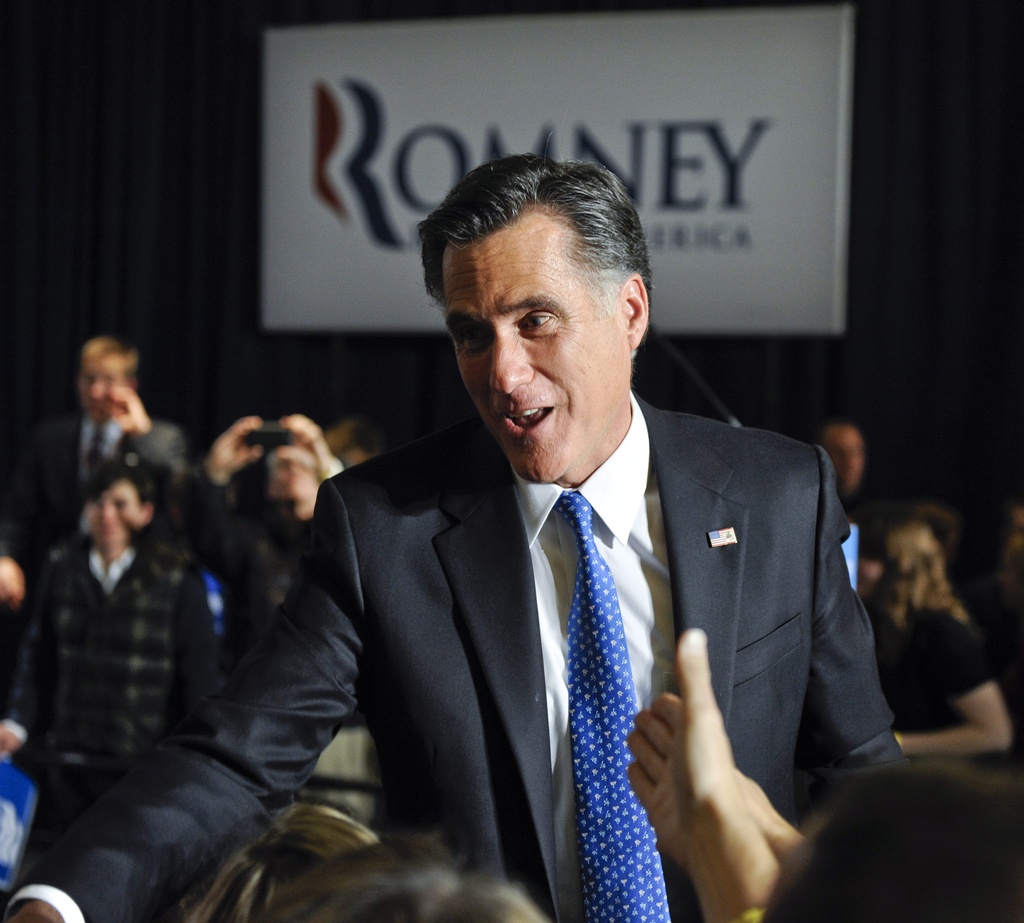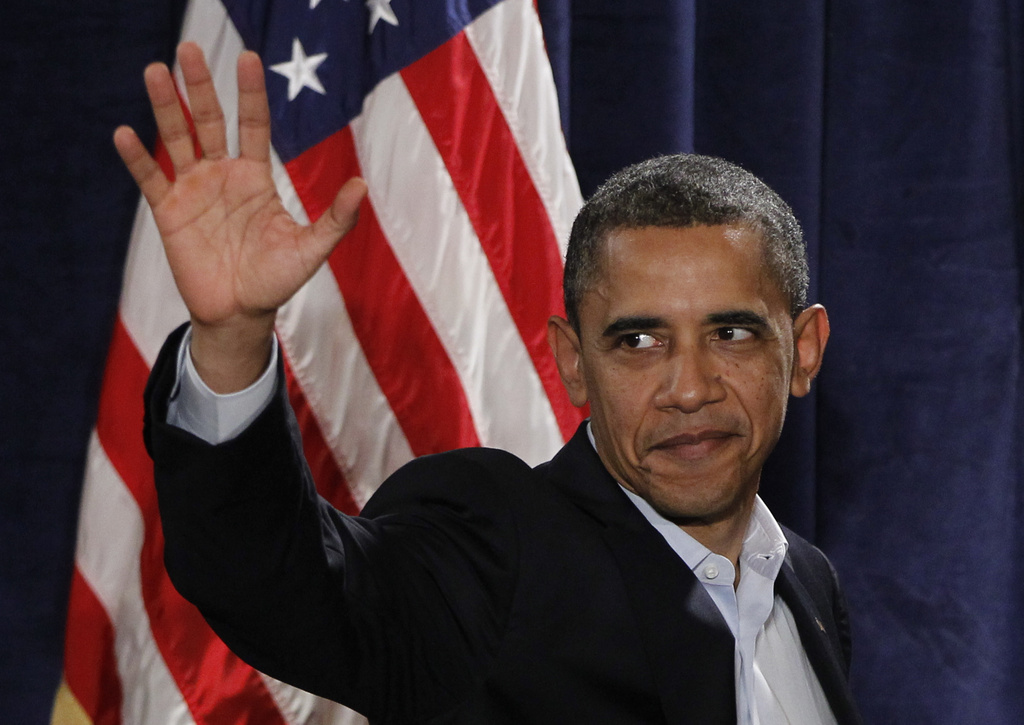Swiss banks back Romney and Obama

UBS and Credit Suisse are, as in the past, playing an important role in the financing of United States presidential campaigns, research has revealed.
At present they are, through their employees, donating more to the Republican candidate Mitt Romney, although they are not entirely neglecting the Democrat incumbent, Barack Obama.
On Tuesday Romney achieved a solid victory in the New Hampshire primary, bringing him a step closer to gaining his party’s nomination.
The two big Swiss banks are among the 20 largest donors to the campaign of Romney, founder of a venture capital firm and former governor of the state of Massachusetts, says the non-profit Center for Responsive Politics which has combed through the financial documents provided each month by the candidates to the Federal Election Commission.
US law states that funds should not be directly paid by companies, but by their employees of their own free will.
Between June 2, 2010, the date upon which Romney declared his candidacy for the presidency, and the end of December, workers at Credit Suisse donated more than $230,000 (SFr218,000) to his campaign.
These contributions make the Zurich bank Romney’s second-largest backer, just behind the US banking and securities firm Goldman Sachs.
During the same period, employees at UBS gave more than $73,000 to the Republican presidential candidate’s campaign. At number 16 on the list of donors, Switzerland’s other big bank is hot on the heels of Bain Capital, the company founded by Romney.
It is ahead of the US bank Wells Fargo and Bain & Company, the firm at which Romney started his career.
“Business friendly”
The Swiss banks are, along with the British Barclays bank and the accounting and audit giant PricewaterhouseCoopers, the only foreign enterprises on the list.
“Mitt Romney is viewed as a very business friendly candidate, he comes from the financial sector and that sector is the one that is contributing the most to his campaign,” Viveca Novak, spokeswoman for the Center for Responsive Politics, told swissinfo.ch.
“Romney is more hands off than Obama in a regulatory sense, while Obama and the Democrats have been trying to prevent another financial meltdown and that involves some regulations on the banks.”
Romney is considered by 65 per cent of Americans to be the strongest candidate to gain the Republican nomination for the November presidential election, according to a recent poll.
But Obama is not being shunned by the financial sector, which contributed heavily to his first presidential campaign. In 2008 UBS and Credit Suisse were also among his 20 largest donors.
Obama “doing well”
Although he announced his intention to run for a second term early, Obama has not had to contest any primaries this year because he has no rival within his Democrat party.
“I wouldn’t be at all surprised if the banks give to Obama once there is a Republican nominee or presumptive nominee,” said Novak.
“Obama has been doing very well so far and has already raised more than $80 million.” This is more than twice the amount collected by Romney.
Novak added that the banking and financial sector was traditionally one of the most active in presidential campaigns in the US.
“Banks have always had a significant interest in supporting candidates to the White House,” she said. The reason is “to be heard, to make sure that their message gets through and their executives can get access to the President and the rest of the Administration”.
Top brass and employees
swissinfo.ch’s interview request to the American branch of UBS remained unanswered. But Victoria Harmon, head of corporate communications at Credit Suisse in the US, confirmed to swissinfo.ch that: “it’s not Credit Suisse that is giving money to Mitt Romney, Barack Obama or any other candidate, it’s employees of Credit Suisse”.
“Employees of the bank who are American citizens have the right, under the Constitution, to participate in presidential campaigns by giving money to the candidates,” she underlined.
“Look up my name and you’ll see that I give to candidates, and I choose to,” added Harmon. According to the Center for Responsive Politics, she sent $350 to Obama on June 27, and $250 on August 4.
Most of the donations come, however, from the banks’ top brass, former managers or individuals who remain close to the banks. The sums are high.
Robert Wolf, chairman for UBS Americas and president for UBS Investment Bank, and an Obama golfing partner, has donated more than $46,000 to the presidential and legislative campaign. Ninety-one per cent of his donations went to Obama or his Democrat friends in Congress.
Romney is considered the front runner in the Republican presidential candidate race.
It is his second campaign to win his party’s nomination. The wealthy 64-year-old lost out to John McCain in 2008. He has been campaigning ever since.
He won Iowa’s caucuses earlier this month by a tiny margin of eight votes, but gained a more solid victory in New Hampshire (39% of the vote).
Primaries and caucuses are being held in every US state before a winner is decided in August.
Romney hopes his background in business will convince Republicans he can manage the economy. But there are concerns about his conservative credentials and some evangelical Christians in the party are uncomfortable with his Mormon religion (he is a fifth-generation Mormon).
He has served a term as governor of Massachusetts. Before that he was the head of the 2002 Salt Lake City winter Olympics and is a former venture capitalist.
Under US law, a company can participate in the financing of a political candidate via a political action committee or PAC, by which it can ask its employees to donate up to $5,000 per election and candidate.
Foreign companies must act through their US branches if they want to contribute to candidate or party financing.
(Sources: Campaign Finance Institute and Center for Responsive Politics)
(Translated from French by Isobel Leybold-Johnson)

In compliance with the JTI standards
More: SWI swissinfo.ch certified by the Journalism Trust Initiative












You can find an overview of ongoing debates with our journalists here . Please join us!
If you want to start a conversation about a topic raised in this article or want to report factual errors, email us at english@swissinfo.ch.